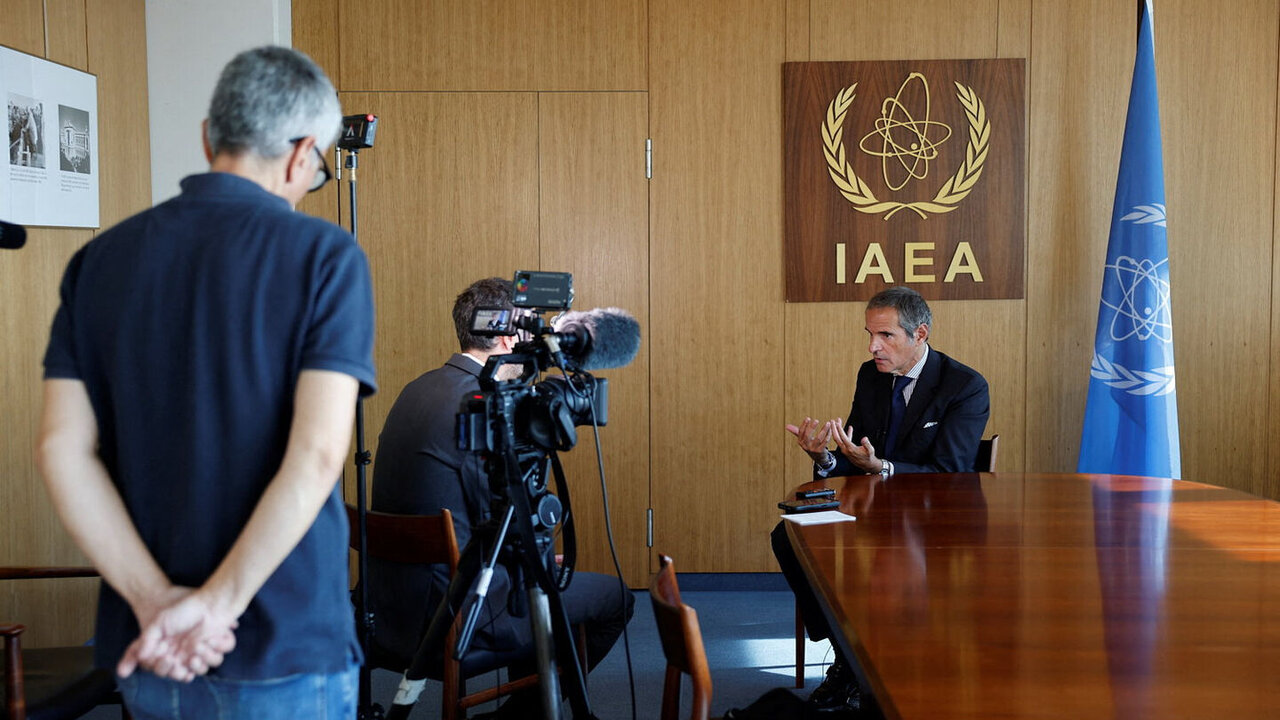Alwaght- About seven months after US and Israeli attacks on Iran's peaceful nuclear program, not only the International Atomic Energy Agency (IAEA) has not condemned the attacks, but also it has become a lever into the West's hands to put pressure on Tehran. Earlier, Director of Iran's Atomic Energy Organization Mohammad Eslami at the 69th general conference of the IAEA in Vienna had said that "we are witnessing the Agency’s lack of professional conduct. This body, without taking any position, failed to condemn the bombing of Iran’s nuclear facilities and acted with remarkable passivity. In the truest sense of the word, it employed a blatant double standard."
These remarks by Iran's nuclear chief are true about the IAEA's double standards. For instance, the stances of the IAEA director about the status of Ukraine's Zaporizhzhia Nuclear Power Station are considerable. He regularly issues statements and resolutions on the attacks on this Ukranian nuclear facility, but he chooses silence when it comes to attacks on Iran's nuclear facilities that are under the strictest international monitoring mechanisms. This issue sends a clear message: the IAEA is adopting double-standard policy when dealing with Iran. This silence to anti-Iranian aggression comes while the Israeli-American attacks against Iran not only have not dealt a blow to the Iranian nuclear industry, but also damaged the UN Charter
Most inspections, most allegations
The Director General of the International Atomic Energy Agency (IAEA) Rafael Grossi has repeatedly accused Iran of a "lack of transparency" in its nuclear program in recent years, both at Board of Governors meetings and in media interviews.
These allegations persist against a starkly disproportionate reality: while Iran's nuclear capacity constitutes less than 3 percent of the global total, the country has been subjected to a staggering 25 percent of all IAEA inspections worldwide. This translates to Iran undergoing ten times more inspections than other nations. This intense scrutiny stands in sharp contrast to the IAEA's passive approach toward the Israeli regime, which possesses nuclear weapons but remains outside the Nuclear Non-Proliferation Treaty (NPT). The Agency has taken no meaningful action against Tel Aviv's nuclear activities.
Adding to this picture of extreme oversight, a Bloomberg report revealed that IAEA inspectors and experts spent a record-breaking total of over 1,100 man-hours on Iranian soil in just a single year. The report further noted that beyond these physical inspections, the IAEA has extensively augmented its scrutiny using a massive volume of new and old satellite imagery of Iran's nuclear facilities.
Despite this unprecedented level of inspection and Iran's close cooperation with IAEA experts over the years, Western officials, particularly from the US, have consistently leveled accusations against Tehran. Critics point to a clear double standard, with the IAEA itself appearing to align its narrative and actions with the Western position against Iran.
Documents questioning agency's neutrality
In the face of its accusation of politicized approach to Iran's nuclear program, the IAEA has always tried to pose itself as a neutral observer. However according to the confidential documents Iran obtained from Israel, Grossi has had close cooperation with Israel as Iran's enemy since 2016 and has played a role in producing biased reports against Iran's nuclear program.
According to leaked documents, Grossi maintains a "special relationship" with the Israeli regime. A growing body of official evidence suggests that Grossi's tenure has marked a turning point, solidifying the IAEA's negative posture towards Iran's peaceful nuclear program.
The body of evidence reveals that since 2016, efforts to build international consensus against Iran, spearheaded by institutions like the IAEA, have been closely coordinated between Israeli representatives and Grossi himself. The documents suggest that prior to every fabricated media campaign against Iran, a specific coordination process between the Israeli regime and Grossi was already underway.
For example, only five months after Iran signed 2015 Joint Comprehensive Plan of Action (JCPOA) with the world powers, Tel Aviv, using the IAEA platform, fabricated news about Iranian plan for using advanced centrifuges in its uranium enrichment by 2027, undermining the nuclear agreement and making ground for an international escalation against Tehran. Though the IAEA in an official letter to Iran denied its role in publication of the fake news, documents held by Iran show that Israel's envoy Merav Zafary-Odiz was in close coordination with Grossi himself.
In one of these documents, Zafary-Odiz, Israel's permanent representative to the International Atomic Energy Agency, in a confidential letter dated May 10, 2016, asked Grossi for an urgent meeting to discuss recent developments.
Zafary-Odiz served as Israel's official representative to the IAEA. From the mid-2010s, particularly during 2014-2016, she was the official spokesperson for Israel's views at IAEA meetings and Board of Governors sessions.
During the JCPOA period, she repeatedly described Iran's cooperation with the Agency as slow and inadequate, accusing the Agency (under Yukiya Amano) of providing "incorrect information" about Iran's nuclear program.
Access to Zafary-Odiz's emails shows that her special mission, besides close and specific coordination with Grossi to influence the agency's approach, was to divert global attention from the regime's non-peaceful nuclear program towards Iran's peaceful nuclear program.
Despite 70 percent of the agency's inspections focusing on Iran's nuclear program, Grossi has repeatedly claimed that restrictions on some inspectors' access were a "serious blow" to the IAEA's monitoring capabilities.
In many instances, Tehran demonstrated its goodwill through technical cooperation, accepting inspectors, and even installing cameras, but the IAEA chief either ignored or downplayed these cooperations. For example, in 2021, Iran allowed Grossi to install specific monitoring cameras at a Karaj site, but the agency's report was still published in strong anti-Iranian language, provoking the ire of the Iranian officials.



























